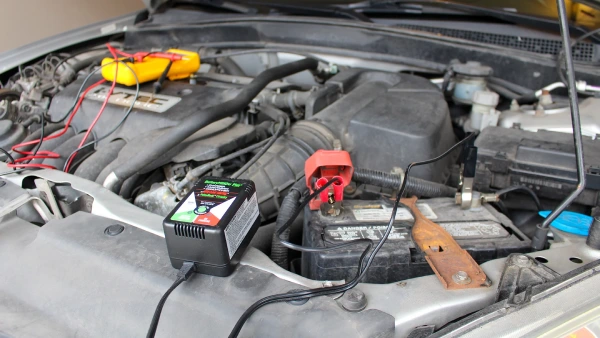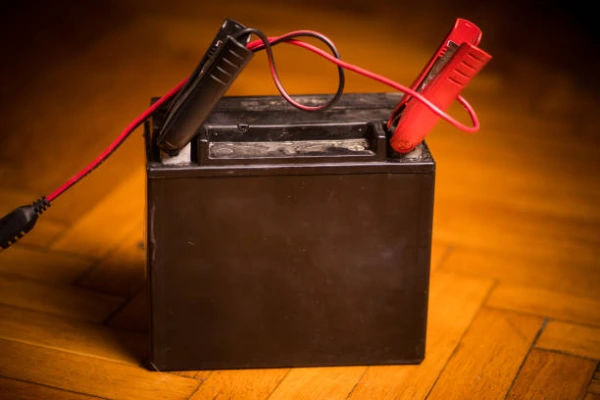A flat battery is one of the most critical issues caused by cars not starting. Moreover, you question how long it takes for a battery to charge. So, the time it takes to charge entirely depends upon different factors. This article will help you understand the basics of battery charging. We will explore the factors influencing charge and how long it takes to charge the battery.

Part 1. Basics of battery charging
So, before understanding how long it takes to charge a battery, let’s go with some basic terms of battery charging.
Definition of mAh
It is a short form of milliampere-hour. It is the unit of electrical charge commonly used to calculate the battery’s capacity. So, it represents the amount of current a battery can deliver over time.
Relationship between Capacity and Charging Time
We can say that the capacity of the battery is measured in milliampere-hour. It estimates how much a battery can hold or store the charges. Charging time is usually affected by different factors. This includes charging rates and the capacity of the battery. So, generally, larger-capacity storage batteries take longer to charge than smaller storage batteries. At the same time, the charging rate remains the same.
Importance of Charging Rates
It is usually called the speed at which the battery is charged. So, typically. It is measured in amperes or milliamperes. Moreover, charging the right rate is important for the battery’s health and safety. Because if the charging is too slow, it can be inconvenient. If you overcharge or charge too quickly, it can degrade the battery. It also caused them to optimize their performance, lifespan, and safety hazards like overheating or swelling of the battery. So, if we talk about different types of storage batteries, they all can have specific charging rates.
Part 2. Why is the battery going dead?

Different factors directly or indirectly affect the battery’s performance and lifespan. So, it goes flat. Let’s discuss these factors in detail.
1. Discharge Process
So, the discharging process is the first reason for the battery to go flat. It can be either due to the chemical reactions inside the battery or the self-discharge. Doing the chemical reactions better generates electricity through a chemical reaction with time. These actions deplete the chemicals within the battery. So, it leads. So, it leads to a decrease in the voltage and depletes the charges.
And while during the self-discharge when. If the battery is unused, it gradually loses its charge due to internal chemical processes.
2. External Factors
The other most common factors are external factors that directly affect and change the battery’s performance.
Temperature: Battery cannot hold hot and very cold temperatures. It can affect its efficiency. High temperatures can increase its evaporation inside the battery. That can lead to corrosion. Moreover, it accelerates chemical reactions. If the temperature is low, it can reduce the battery’s ability to
deliver power or store the charges.
3. Parasitic Drain
It is also a very common effect of the battery. Some devices continue to draw power from the battery even when turned off. So, this parasitic drain can gradually decrease the battery life.
4. Load
Different devices are connected to the battery to withdraw the power. The load depends upon what device is connected to it. So, it directly affects the battery’s performance.
5. Age and Usage of Battery
The next important factor influencing the battery’s life is its age and usage per cycle. The battery has a limited number of charge-discharge cycles. Moreover, they can undergo it before the capacity significantly. Secondly, the storage conditions also affect the battery. If the battery has improper storage, it can leave it fully discharged.
Part 3. How long does it take for a battery to charge?
If we talk about how long it takes to charge the battery. We can apply the general rule of thumb. It can take several hours to charge a battery fully. For instance, if you want to charge a smartphone battery from complete to full, it can take around 1 hour with a standard charger.
However, larger storage batteries, such as car batteries or power tools, can take much longer. It also can take several hours or even overnight to charge fully from a dead state. So, different factors directly affect the charging time of dead batteries. Let’s discuss them here.
- Battery capacity: It directly influences the battery’s charging timing. So, the larger the capacity of the storage batteries, the longer it will take to charge completely.
- Charging Rate: The rate at which the battery is being charged. The higher the charging rate, the faster the battery will charge, but ensure the charging rate is within safe limits; otherwise, it can go overcharged and deteriorate the battery’s quality.
- Initial state of charge: It also affects the battery’s charging time. So, suppose the battery is completely dead or completely discharged. In that case, it will take longer to charge than a partially charged battery.
- Charger efficiency: The charging equipment must be of good quality. Because it plays a very important role in fast charging, using a higher-quality charger may charge more efficiently. Additionally, it can reduce overall charging time.
Part 4. Linear charger vs. multi-stage charger
Although both linear and multi-stage charges have their remarkable functions. So, let’s discuss them in depth. They will hel us understand how long it takes to charge the battery.
| Aspect | Linear Battery Charger | Multi-Stage Charger |
|---|---|---|
| Charging Method | Provides a constant and steady flow of power | Adjusts charging process in different stages |
| Efficiency | Less efficient | More efficient |
| Charging Speed | Slower | Faster, especially in later stages |
| Battery Health | May overcharge and degrade the battery | Optimizes battery health, prolongs lifespan |
| Complexity | Simple design | More complex design |
| Suitability | Suitable for basic charging needs | Suitable for various battery types and sizes |
Part 5. How to avoid overcharging a car battery
So, let’s discuss signs of overcharging and what remedies we can use to fix this issue.
Signs of Overcharging of Car Battery
So here are some signs of overcharging of your car battery.
- Excessive Heat: If you notice any heat from your car battery. It is a sign of overcharging. Due to this, your battery becomes unusually hot during or after charging.、
- Swelling or Bulging: if your car battery starts to swell or bulge, make sure it is because of overcharging. Charging can heat the electrolyte inside the battery, and it eventually expands. So this leads to swelling or bulging at the battery.
- Corrosion: If you provide more heat to the battery, its electrolytes evaporate, and internal corrosion happens. Moreover, the overcharging also accelerates the corrosion of the battery terminals and the connectors. So, if you find excessive corrosion around the terminals, it is because of the overcharging.
- Electrolyte Boiling: It is a severe case of our charging that your electrolyte starts to boil, leading to the boiling point. As a result, it causes bubbles out of it or even leaks out of the battery.
How to Avoid battery Overcharging
You can avoid overcharging, and there are multiple ways you can adopt.
- You must use an appropriate charger that is specifically designed for the storage of batteries. So, it will give you features like automatic shutoff or voltage regulations to prevent overcharging.
- You must follow the manufacturer’s recommendations because different storage batteries may have specific charging requirements.
- You must avoid leaving the storage batteries connected to the charger for a long time. So, you must disconnect it once the battery is fully charged.
- Try to thoroughly check if your charger has adjustable settings, and make sure they are correct according to the type and the size of the battery.
Part 6. Conclusion
In conclusion, how long does it take to charge the battery? Charging a battery can take a long time. It depends upon several factors, like capacity and the battery’s charging rate. Moreover, larger batteries take longer to charge. At the same time, faster charging rates can speed up the charging process. So, it is important to avoid overcharging, as it can damage the battery. There are multiple signs of overcharging, like excessive heat, swelling, and corrosion. You can prevent these signs by following up properly. So, overall, charging a battery requires patience and attention. So it. It can get or reach optimal performance and longevity.
Part 7. FAQs
-
How long it takes to charge the battery with a 12-volt charger?
It can take several hours to charge a battery of 12V. Its exact time depends upon the size of the battery and how quickly it trains. Sometimes, it takes overnight to fully charge a dead battery or less. -
Do car storage batteries charge while idling?
Yes, the battery can be charged while idling. In this case, the alternative produces ethnicity. This. Electricity charges the battery. However, charging while adding is slower than driving because the engine is not running at full power. -
How long does a car have to run to charge a dead battery?
Suppose the car battery can charge properly for around 30 minutes to a few hours. But it also depends upon how the battery is. It might take a long time if it is fully drained, but if it is partially drained, it can take only a few hours. -
Can a completely dead battery be recharged?
Yes, a dead battery can be completely recharged. However, it takes a longer time. Moreover, proper attention is needed to make sure it is charged safely.
Related Tags:
More Articles

Overview of Deep Cycle Lithium Battery
In this article, we explore the life, voltage, capacity, and charging considerations of deep cycle lithium batteries.
How Long do Lithium Batteries Last?
How long do lithium batteries last? we will explore the factors that influence the lifespan of lithium batteries and provide insights into their longevity.
How to Choose the Best LiFePO4 Battery?
Choose LiFePO4 batteries for superior performance, safety, and versatility in EVs, UPS, and backup power. This guide helps you make informed decisions.
Get 12v Lithium Car Battery As a Power Source for the Ride
Make the right choice for your vehicle's battery needs by installing a 12 volt lithium car battery. You will enjoy maintenance-free longevity with this change.
Everything About A Small Lithium Ion Battery
Discover the features, uses & future potential of a small lithium ion battery. A compact and tiny powerhouse ideal for smartphones, wearables, drones & more.





